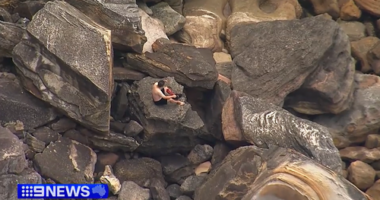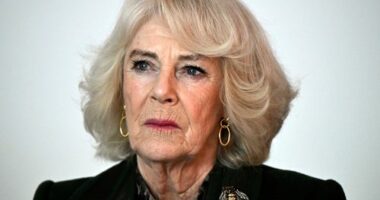Share this @internewscast.com
Key Points
- Following World War Two, more than 650 Japanese women migrated to Australia as the wives of Australian servicemen.
- The granddaughters of Japanese war brides share how they keep their family’s stories alive through their work as an author, artist and historian.
- This year marks the 80th anniversary of the end of World War Two.
“My grandfather (Gordon Parker) said yes to every interview … He knew it was important to keep this story talked about. If you go into the archives of Australian media over the past 75 to 80 years, about every decade, you’ll find a few different articles about the Parker family,” the author and screenwriter told SBS Japanese.

The reunited Parker Family grin as Cherry, Gordon and their children arrive at Essendon airport. L to R: Margaret, Venn, Cherry, Harry, Gordon and Kathleen. Credit: Press photo
Parker said her grandparent’s story was “never a secret”, with grandchildren routinely paraded before curious journalists.
The so-called war brides were women who migrated to Australia largely in the 1950s as the spouses of Australian servicemen. After the end of World War Two, more than 650 Japanese war brides came to Australia.
“Of course, it was a difficult time for them.”
Honouring the legacy
“I had always dreamed of being a writer and I’d dreamed of telling my grandparents’ story ever since I was a little kid. I knew the story was really important and I didn’t want it forgotten,” she said.

The entire Parker family in the 1960s. L to R: Gordon, Linda, Ian, Ed, Jen, Rob, Harry, Kathy, Margie and Cherry. Credit: Press photo
In the book, Parker said she made a point of highlighting Cherry’s point of view, as over the years, her grandfather had largely taken the role of a storyteller in the media due to the language barrier.
“Whether it’s an older person or a younger person, it’s been so heartening to see how people have connected with the story.”

Japanese-Australian author and screenwriter Alli Parker with her grandmother Cherry Parker at Christmas 2019. Credit: Alli Parker
Reflecting on her own identity, Parker said growing up in the 1990s she had a vastly different experience of Australia than her father, Rob Parker, who is half Japanese.
“But it’s so small compared to what my grandmother went through. And what dad and his brothers and sisters went through.”

The extended Parker family and friends at Cherry’s 90th birthday in 2019. Credit: Parker family archives
Importance of telling stories
“For so long, issues of racism had been very taboo. Maybe because she is a lot older now, or because my grandfather has passed away, she was more comfortable opening up.”

Historian Anna Wilkinson with her grandmother Yachiyo. Credit: Anna Wilkinson
As a historian, Wilkinson thinks telling stories from the past is important for various reasons.
“I think that is really important for today, especially today, to create a more cohesive world.”
Passing the baton
“She kind of paved the way for other people to come to Australia at the time when the White Australia policy was in full effect. I had a sense of ownership and pride about our family’s stories, and wanting to really represent that in the work that I create.”

Japanese-Australian artist Elysha Rei (left) and her grandmother Akiko Kirkham. Credit: Elysha Rei
In 2023, Rei created an artwork titled Rabbit (proof) fence after coming across her grandmother’s alien immigration file in the National Archives of Australia.
“Seeing her documented in the archives (I realised) also just how politicised her identity was in the language which was used in these papers.”

‘Rabbit (proof) fence’ by Elysha Rei. Credit: Elysha Rei
Rabbit (proof) fence is a hand cut paper installation modelled after the State Barrier Fence of Western Australia, which began construction in 1901, the same year the White Australia Policy started.
The artwork demonstrates how Akiko – who was born in the Year of the Rabbit – managed to make a hole in the fence, arriving in Australia in 1953 and raising a family of four children.

Akiko Kirkham (nee Hirano). Credit: Elysha Rei
Rei shared her favourite story about her grandmother.
“(The story) shows (her) adaptability and resilience, and I think it’s a fantastic way to demonstrate how she persevered but also adapted to her surroundings.”
Listen to SBS Japanese Audio on Tue, Thu and Fri from 1pm on SBS 3.
Replays from 10pm on Tue, Thu and Sat on SBS1.











